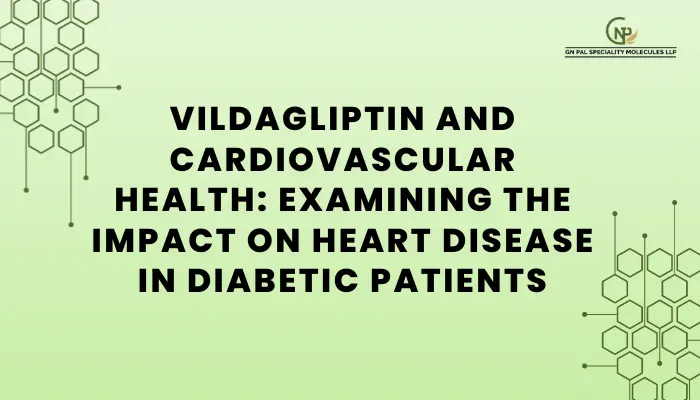Diabetes mellitus is a chronic condition that significantly impacts global health, affecting millions worldwide. While managing blood glucose levels is a primary focus for those with diabetes, it’s equally important to address the increased risk of cardiovascular diseases (CVD) associated with the condition. Vildagliptin, a dipeptidyl peptidase-4 (DPP-4) inhibitor, has gained attention not only for its glucose-lowering effects but also for its potential impact on cardiovascular health. This blog delves into the relationship between Vildagliptin and cardiovascular health, exploring how it may influence heart disease in diabetic patients.
UNDERSTANDING THE LINK BETWEEN DIABETES AND CARDIOVASCULAR DISEASE
Before examining Vildagliptin’s role, it’s crucial to understand the connection between diabetes and cardiovascular health. Diabetes can lead to a higher risk of various cardiovascular issues, including coronary artery disease, heart failure, and stroke. This increased risk is often due to the combination of high blood glucose levels, hypertension, dyslipidemia, and other factors that damage blood vessels and impair heart function over time.
VILDAGLIPTIN’S MECHANISM OF ACTION
Vildagliptin works by inhibiting the DPP-4 enzyme, which in turn increases the levels of incretins (GLP-1 and GIP). These hormones are responsible for stimulating insulin release and suppressing glucagon secretion in a glucose-dependent manner. By enhancing the incretin system, Vildagliptin helps lower blood glucose levels. But the question remains: how does this mechanism potentially affect cardiovascular health?
CARDIOVASCULAR BENEFITS OF VILDAGLIPTIN
Recent studies and trials have begun to shed light on the cardiovascular implications of Vildagliptin therapy. Some of the potential benefits include:
Improved Endothelial Function: The endothelium plays a crucial role in vascular health, and its dysfunction is a predictor of cardiovascular events. Vildagliptin may improve endothelial function by reducing inflammation and oxidative stress, thus potentially lowering the risk of atherosclerosis.
Blood Pressure Reduction: Though not a primary effect, some studies have indicated that Vildagliptin might help reduce blood pressure slightly, which is beneficial for cardiovascular health.
Lipid Profile Modification: There’s evidence to suggest that Vildagliptin may have a favourable effect on the lipid profile, although this is not its primary action and more research is needed to confirm these findings.
Anti-inflammatory Effects: Chronic inflammation is a known factor in the development of both diabetes and cardiovascular disease. Vildagliptin may help reduce inflammatory markers, contributing to a lower risk of cardiovascular events.
Impact on Cardiac Function: Some research suggests that Vildagliptin might improve cardiac function, particularly in patients with heart failure, by enhancing left ventricular function and reducing hospitalization rates for heart failure.
CLINICAL TRIALS AND STUDIES
Several significant clinical trials have explored the cardiovascular safety of Vildagliptin. The VIVIDD (Vildagliptin in Ventricular Dysfunction Diabetes) trial, for example, investigated the effects of Vildagliptin on left ventricular function in people with Type 2 diabetes and heart failure. Another notable study, the TECOS (Trial Evaluating Cardiovascular Outcomes with Sitagliptin), assessed cardiovascular outcomes in patients treated with DPP-4 inhibitors, providing valuable insights into the class’s safety profile.
While these studies generally support the cardiovascular safety of Vildagliptin, it’s important to note that they are not without limitations, and ongoing research is needed to fully understand the long-term implications.
PRECAUTIONS AND PATIENT CONSIDERATIONS
While the potential cardiovascular benefits of Vildagliptin are promising, healthcare providers must consider each patient’s overall health and risk factors. Patients with a history of heart disease, heart failure, or other cardiovascular issues should discuss the risks and benefits of Vildagliptin with their healthcare provider.
Additionally, as with any medication, monitoring for potential side effects and adverse reactions is vital. Patients should be educated about the signs of heart-related issues and advised to seek medical attention if they experience symptoms such as chest pain, shortness of breath, or irregular heartbeat.
CONCLUSION
Vildagliptin represents an exciting area of study in the intersection of diabetes management and cardiovascular health. While current evidence suggests it has a neutral to potentially beneficial impact on heart disease in diabetic patients, further long-term and comprehensive studies are essential. For individuals with Type 2 diabetes, particularly those with additional cardiovascular risk factors, Vildagliptin may offer a dual benefit by controlling blood sugar levels while also contributing to heart health. As always, treatment decisions should be made on an individual basis, considering the patient’s specific health profile and in consultation with a healthcare professional. As research progresses, the hope is to continue enhancing the lives of those with diabetes through improved cardiovascular outcomes and overall well-being.




